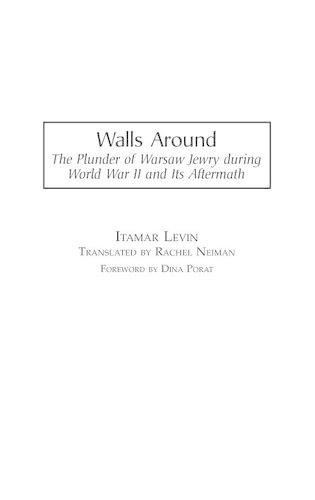
Walls Around: The Plunder of Warsaw Jewry during World War II and Its Aftermath
(Hardback)
Publishing Details
Walls Around: The Plunder of Warsaw Jewry during World War II and Its Aftermath
By (Author) Itamar Levin
By (author) Rachel Neiman
Bloomsbury Publishing PLC
Praeger Publishers Inc
30th May 2004
United States
Classifications
General
Non Fiction
Second World War
Modern warfare
The Holocaust
940.5318094384
Physical Properties
Hardback
304
Width 156mm, Height 235mm
567g
Description
On the eve of the Holocaust, Warsaw was the home of the biggest Jewish community in Europe, some 350,000 Jews. They were a third of the city's total population and owned up to forty percent of its land. The Nazis systematically seized their property even before the Ghetto was established and made the Jews penniless and unable to work. Thus tens of thousands starved to death or died of infectious diseases. As Levin makes clear, the plunder of Jewish property became not only a product of murder, but also a tool of murder. Because Hitler decided only in the spring of 1941 on the mass murder of the Jews, the Warsaw case demonstrates - at least in retrospective - how the seizure of property killed even before the first qas chambers were built. After the Holocaust, the Communist regime in Poland took advantage of the fact that ninety percent of the country's Jews had been murdered to nationalize their private and communal property without paying any compensation. The vast majority of this property has never been returned to their lawful owners despite increasing international efforts to bring this about.
Reviews
"The book under review presents the thesis that theft of Jewish property was not a by-product of genocide, but rather a direct motivation for it....[L]evin argues that had Jewish property not been stolen and Jews prevented from earning wages, the Germans could not have brought about the deaths of so many in the Warsaw Ghetto before embarking on a campaign of systematic genocide. Summing Up: Recommended. Upper-division undergraduates and above."-Choice
The book under review presents the thesis that theft of Jewish property was not a by-product of genocide, but rather a direct motivation for it....[L]evin argues that had Jewish property not been stolen and Jews prevented from earning wages, the Germans could not have brought about the deaths of so many in the Warsaw Ghetto before embarking on a campaign of systematic genocide. Summing Up: Recommended. Upper-division undergraduates and above.-Choice
Author Bio
Itamar Levin is Deputy Editor in Chief, Globes - Israel's Business Newspaper. He is the world's leading journalist uncovering the issue of Holocaust victims' assets Rachel Neiman is Managing Editor of Israel's Business Arena (Globes' English web site).
